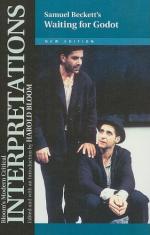|
This section contains 1,716 words (approx. 6 pages at 300 words per page) |

|
There is no literary parallel for [Molloy, Malone Dies, and The Unnamable,] the three books in which Samuel Beckett, releasing a certain violence of temperament evident in his earliest works and suppressed in Murphy and Watt, turned his face away from every accessible satisfaction, even from the familiar contours of his own language, and jettisoning the very matrices of fiction—narrator, setting, characters, theme, plot—devoted his scrutiny … to the very heart of novel writing: a man in a room writing things out of his head while every breath he draws brings death nearer.
From that everything flows, including the bedridden Malone's frequent proposal to enumerate his possessions, like a senescent Crusoe. Reminiscence, fantasy, description, reflection, all the paraphernalia of fiction pass through these books with the disarming obviousness of the unexpected. The narrator constantly shifts his focus of attention in order to keep himself interested. That is...
|
This section contains 1,716 words (approx. 6 pages at 300 words per page) |

|


